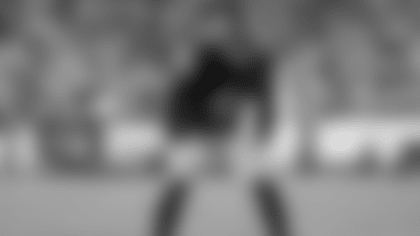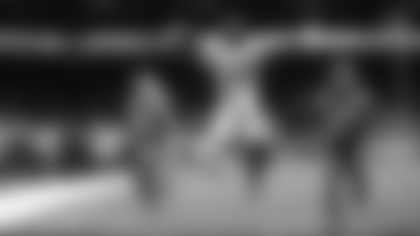Q. Several times since the team arrived at Saint Vincent College back on July 26, you have talked about the benefits of being away for training camp, the informal moments, the bonding, the team building that goes on. What about the presence of the fans, watching practices, interacting with players and coaches, seeking autographs, etc. What impact does that have?
A. It's inspirational, to be quite honest with you, to feel the support and energy of the fans day to day on the dog days of August I think is inspirational to all of us. It's a source of energy. And we'd like to entertain them. A lot of these guys, as athletes, are entertainers and they like to hear the roar of the crowd, they like to create it. It really adds value and urgency to the work that we're doing here day to day.
Q. You seem to approach everything that comes up during training camp as a teaching tool. In that respect, how did you utilize the ever-changing practice schedule – different venues, different starting times – over the last week?
A. You're absolutely right in that regard. I just think that when things are irregular it's an opportunity to teach and learn because during the course of the journey that is the football season, there are going to be things that are irregular. There are going to be irregular weeks when you play on Thursday nights. There could be irregular itineraries as you lead up to a game for weather purposes or travel related issues, and none of that matters ultimately. What matters is that we have a unit that's ready when we kick that ball off, and so we take the same approach to these daily practice opportunities. When weather and things dictate that we're light on our feet, I challenge the group to be light on their feet, while at the same time being ready to perform.
Q. How do you broach that issue with a team? Is there an announcement?
A. We can do mass texts now, which is great. Back in the day, it was a challenge to communicate it to everyone and doing so appropriately. You'd have to call impromptu team meetings to gather the group, but in 2022, and you can just send everybody a mass text, and they'll have the information instantaneously.
Q. You always seem so upbeat, so positive when you meet with the media after a training camp practice. Do you ever get angry during a practice, or get angry because of what you saw at practice, and what would make you angry?
A. No question that I get angry. There are disappointments and anger involved in the process. But I also try to maintain a big picture approach, particularly at the early stages of team development. No matter what happens good or bad is an opportunity to teach and learn for the people involved and the people on the perimeter. And that's why largely I maintain the positive spirit about what's going on because you're gonna miss those opportunities when you don't. But largely, there are moments of anger. They're points of emphasis of the day. They're the ways that we're challenging guys, and when those challenges aren't met, there's a reaction certainly.
Q. But are there triggers? Bill Cowher absolutely hated pre-snap penalties, as an example.
A. Center-quarterback exchanges are a sticking point for me because it robs the other 20 guys on the field of a play. And it's very fundamental. There's big time responsibility between the center and quarterback for me. That's a trigger. Post-play shenanigans. Less than professional things, taunting and things of that nature that are being emphasized by the officials. You just can't let your guard down in a practice setting. Oftentimes guys say, "Coach I wouldn't do it in a game. It's practice." No, we practice how we play. And so, we all as coaches have pet peeves if you will, the triggers, and I do a really thoughtful job of making mine known because I want to minimize some of that. If you give a capable man information, then he does the rest. So I don't keep secrets. People know my triggers and my pet peeves.
Q. Players have confirmed that during dinner in the cafeteria on campus, the unit that wins the competition periods during that day's practice is treated to an enhanced menu while the losing unit is served food that's on the regular menu. On the enhanced menu, for example, it might be lobster and crab legs, or lobster and steak. How did you come up with that idea, what is its purpose, and do you believe it actually works?
A. It is actually an old practice that's gone on in the college ranks for generations. I participated in it as a college football player. A lot of guys and some of the programs still participate in that type of motivation. It's simple. You just want to add a little sugar on top to the daily competition. You want to take what could be drudgery or a mundane activity and try to add a little spice to it. So we just need to be innovative in our motivational tactics, and quality food is a nice added feature. In the college days it used to be bad food for the losers. It used to be beans and franks, or bologna, or something like that. We're a professional football outfit in 2022, so I decided to take it in the other direction.
Q. There supposedly are signs in the cafeteria directing the winning unit to a special area where the better food is served, and then everyone else is directed another way. That's very creative, but does it actually work?
A. I hope it does. I know that I'm petty enough to try it. You just want to add a little flavor to these days. Winning is our business, and we're professionals, but the game of football is something these guys have been involved in all of their lives, and there are little fun activities and nuances of the culture that we get a chance to immerse ourselves in in an environment like this. "To the victor goes the spoils" is an awesome thing. It's fun to watch the coaches because this applies to the coaches as well. The winning unit's coaches get to eat good. The losing coaches do not. Danny Smith and I, we eat good every day.
Q. After last Wednesday's practice, you were asked about rookie receiver George Pickens, and you said, "He's got talent, but there's a big difference between talent and skill." What did you mean by that?
A. You know, talent is what God gives you. It's an aptitude, or it's pedigree, if you will. Skill are the things that you work on day to day and develop through labor, the things relative to the game or the position that you play. And so, it's obvious and easy to see that he is a talented guy. But like everyone else, he's learning the minutia that's required for him to be successful on a professional level. And that's a very skill-oriented thing, things that have to be worked daily.
Q. What are you looking for from your team against the Seahawks?
A. First and foremost, I want to see energy and enthusiasm. You know, oftentimes that's underscored, but when you bring a proper spirit, a supportive energy, encouraging and helping each other, uplifting each other, whether it's an individual, whether it's a unit, whether it's complimentary football from an individual standpoint, or from a unit standpoint, it is very helpful in terms of securing victory, particularly at this stage of the game. The next thing I want to see is fundamental things. I don't expect guys to get in the stadium environment and go native, as we say in the business. I want to see detailed hand usage relative to their position. I want them to display situational awareness. When you display situational awareness, then it helps you make situational plays. I want to see underneath defenders on third-and-4 being chains-aware and reducing the depth of their drop and allowing themselves to make the tackle for 2 or 3 yards and then get their fists in the air, for example. And so situational awareness leads to situational playmaking, fundamental components of play relative to their positions, and the energy and enthusiasm that one should expect. Getting in a stadium are things that can make tonight a big night.
Q. The quarterback competition has been center stage even before the team reported to training camp. In terms of the execution of that competition, what do you need to accomplish?
A. I think stepping into a stadium and putting these guys in a live pocket is a significant component of evaluating them individually and collectively and sorting out this battle. You practice in drill-like settings and it's football-like, but it's not football. We're going to be prudent and smart in terms of the protection of the quarterback and keeping a clean pocket in a practice setting. The live pocket component of preseason football is significant. Their ability to make timely decisions under those circumstances is critical. Their ability to protect the football and themselves, their ability to move their units under those circumstances is really telling, and I'm excited about watching those guys display their skills and talent within the confines of a stadium.
Q. Do you need to make a decision before the end of the preseason?
A. I think it will reveal itself. You know, it's not a decision to be made by me or others. It's a decision to be made by them and their play. All we have to do is sort out what it is that we see. That's the mentality that I bring to it, and that's the mentality that I want them to have. I want them to know that these are not mystical decisions. These are concrete, tangible decisions that are borne out of performance and the quality of those performances. And so I don't want them rubbing a lucky rabbit's foot and things of that nature. I just want them playing well, and the quality of that play is going to determine what happens moving forward.
Q. In the first snap of the first 11-on-11 work of every practice since the start of OTAs, Mitch Trubisky has been at quarterback with the first group. Does that indicate that it's his job to lose?
A. No, that just indicates that was the premise that we chose to start with. You have to start somewhere, and I was very transparent and open with these guys. Mitch has the most established professional football resume among the group, and so I just thought that was respectful and appropriate in terms of beginning. Mason is second, and obviously Kenny doesn't have a professional resume to speak of. So that's the premise in which we begin and have begun this process. I meant what I said when I said I wasn't going to be blowing in the wind in terms of the reps, that the depth chart doesn't ride on every throw. I think you cut their leadership legs out from under them when you have that mentality. And so, we're going through this process, and the quality of the play, particularly in-stadium, will determine how it unfolds moving forward.
Q. You mentioned that you weren't going to be blowing in the wind and changing the depth chart with every throw. Do you keep that mindset once you make the decision on the starter, in terms of how long his "leash" will be?
A. I don't want the "starter" to think he's on a short leash. I want people to play to win and not to play not to lose whether it's their game, or it's a job. No, I want all of our guys, regardless of role and position to have a can-do attitude and to bring a spirit to work that is geared toward getting things done as opposed to the opposite.
Q. During a recent appearance on the DVE Morning Show, you said about your defense, "We have the men, not only in personnel but in schematics and coaching. I expect them to be dominant." What qualifies as dominant? Statistics? Awards?
A. You tell me. Give me a circumstance, and I'll tell you what dominant defenses do. Dominant defenses smile in the face of adversity. The offense turns the ball over and puts them on a short field, they stand up. They stand up in the weighty moments – goal-line, short-yardage, two-minute. You know, (dominant) means a lot of things, and I was thoughtful when I said it because I want them to be what we need them to be whenever we need them to be it. And so dominant defenses are ready in a moment's notice, to put out a fire, to provide a winning edge, to take the ball away, to do the things that positions your team for victory.
Q. So "dominant" isn't based on a statistic, or a league ranking?
A. You can hide behind statistics, and I don't want to hide. Statistics are just a component of it. Do I expect our statistics to be impressive relative to our peers? Certainly. But I'm not going to seek comfort in that. We've got to be what this team needs us to be in significant moments as well.














